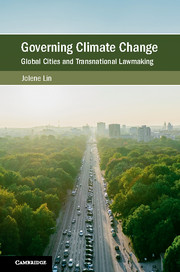Book contents
- Governing Climate Change
- Cambridge Studies on Environment, Energy and Natural Resources Governance
- Governing Climate Change
- Copyright page
- Contents
- Acknowledgements
- Abbreviations
- 1 Global Cities, Climate Change, and Transnational Lawmaking
- 2 Theoretical Framework
- 3 The Rise of the City in International Affairs
- 4 City Action on Climate Change
- 5 Transnational Urban Climate Governance via Networks: The Case of C40
- 6 Cities as Transnational Lawmakers
- 7 A Normative Assessment of Urban Climate Law
- 8 Conclusion
- Select Bibliography
- Index
7 - A Normative Assessment of Urban Climate Law
Published online by Cambridge University Press: 04 June 2018
- Governing Climate Change
- Cambridge Studies on Environment, Energy and Natural Resources Governance
- Governing Climate Change
- Copyright page
- Contents
- Acknowledgements
- Abbreviations
- 1 Global Cities, Climate Change, and Transnational Lawmaking
- 2 Theoretical Framework
- 3 The Rise of the City in International Affairs
- 4 City Action on Climate Change
- 5 Transnational Urban Climate Governance via Networks: The Case of C40
- 6 Cities as Transnational Lawmakers
- 7 A Normative Assessment of Urban Climate Law
- 8 Conclusion
- Select Bibliography
- Index
Summary
INTRODUCTION
The preceding chapters examined in detail what five global cities are doing to address climate change and how global cities have come together to form a transnational network to scale up their climate actions and facilitate the diffusion of norms, practices, and voluntary standards. Chapter 6 examined the mechanisms of urban climate law and its interactions with the UNFCCC normative framework. This chapter endeavours to take a step back from the intricate details and consider some ‘big picture’ questions. The first question I would like to explore in this chapter is how the transnational cooperative efforts among global cities and urban climate law contribute towards the performance of the transnational climate change regime complex.
Throughout this book, Abbott's conception of the transnational climate change regime complex has been used to frame the discussion of how multiple governance actors and institutions currently govern climate change. As mentioned in Chapter 2, Abbott's definition is a refinement of Keohane and Victor's conceptualization of the climate change regime complex in their article published in 2011 as ‘a loosely coupled system of institutions … [which] are linked in complementary ways’. In this framing, urban climate law constitutes a regime or institution within the regime complex. Keohane and Victor offer six evaluative criteria to assess regime complexes normatively and also identify some ways in which the functioning of the climate change regime complex can be improved. These six criteria are: (1) coherence amongst regimes in the sense of being compatible and mutually reinforcing, (2) accountability to relevant audiences, (3) determinacy of rules in order to enhance compliance and reduce uncertainty, (4) sustainability in the sense of being durable, (5) epistemic quality in rules, and (6) fairness in the sense that ‘[institutions] should provide benefits widely’. The choice of these criteria is not random; factors such as coherence and the epistemic quality of rules are widely used as benchmarks to evaluate the integrity and soundness of normative systems. In Section 7.2 of this chapter, these six criteria will be used to evaluate the extent to which urban climate law contributes towards enhancing the overall performance of the transnational climate change regime complex.
- Type
- Chapter
- Information
- Governing Climate ChangeGlobal Cities and Transnational Lawmaking, pp. 160 - 186Publisher: Cambridge University PressPrint publication year: 2018

